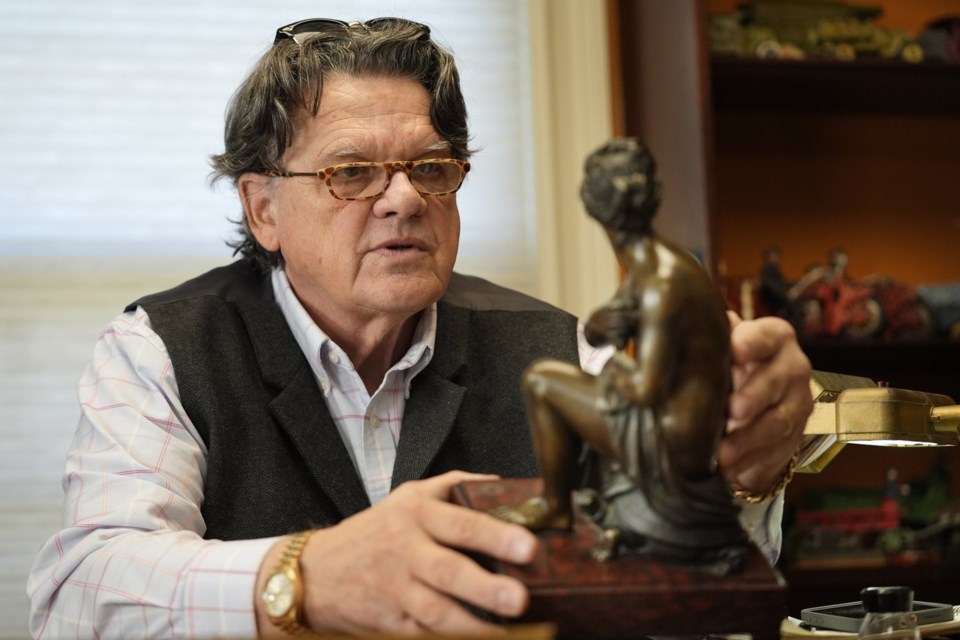THOMASTON, Maine (AP) ŌĆö Kaja Veilleux has been hunting New England attic treasures for more than 50 years. He once found a copy of the Declaration of Independence sitting on a pile of trash, and he when he stumbled upon a million-dollar portrait gathering dust in an old farmhouse in Maine that may have been painted by the Dutch master Rembrandt.
Then there was the time, Veilleux said, he was shown a $50,000 gold coin kicking around in a tool drawer ŌĆö only to have the well-meaning owner destroy much of its value before he could auction it by using a scouring pad to clean it ŌĆö and scratch it.
ŌĆ£It's like a treasure hunt every day," Veilleux said with a chuckle.
Many people dream of cashing in on some dusty, old heirloom. In October, three sisters from Ohio for more than half-a-million dollars. Two years ago, a case of found in a 91įŁ┤┤ home sold for more than $3.7 million.
Veilleux, 73, helps people sort gems from junk when he appraises furniture, antiques and art by using his knowledge of what similar items have sold for in the past. But art auctions can be fickle. Who could have guessed a could sell for more than $6 million?
A fake provided an early lesson
Veilleux started collecting coins at age 8 and soon found he had a good memory for visual objects. His training for a career in antique dealing has all been on the job, he said, including a lesson he learned early when he spent most of the money he had at the time on bidding for a beautiful miniature painting.
When he got home from the auction and looked at the artwork under a magnifying glass, he realized it was a print, with dabs of paint added to make it look genuine.
ŌĆ£I paid $350 for a $35 object, which always taught me to look at things very carefully,ŌĆØ Veilleux said.
In the late 1990s, he was at a house call in South Freeport, Maine. It was a hoarder's house, he said, where piles of trash were awaiting their trip to an already-full dumpster. Atop one pile, Veilleux spotted what was later confirmed to be a 1776 copy of the Declaration of Independence.
He auctioned it for $99,000 but the state of Maine sued to take possession of the document, and won. That meant both the buyer and seller ended up missing out.
A possible Rembrandt is found in Maine
This year's artwork find was his most valuable yet. Veilleux said he and an assistant were on a house call in Camden, Maine.
ŌĆ£We start going through the house and there were rare little things and big things everywhere,ŌĆØ Veilleux said. ŌĆ£Finally, we are on the third floor near the attic, and we find a stack of paintings, and in it is this beautiful portrait of a young woman by Rembrandt.ŌĆØ
The painting of a teenage girl in a black dress with a white ruffled collar was sold as ŌĆ£after Rembrandt,ŌĆØ meaning it was in the style of the 17th Century master but wasn't proven to be by him. The artwork sold for $1.4 million, including auction fees, indicating the buyer was willing to take a significant gamble the painting was a Rembrandt ŌĆö although it would have likely sold for many times that price with a proven provenance.
People seek to value their heirlooms
Each Tuesday, people bring in their heirlooms and collectorŌĆÖs items to Veilleux's office in Thomaston, Maine, to see what they might fetch at auction. The appraisal is free but Veilleux gets a commission if they end up selling the pieces at his Thomaston Place Auction Galleries.
Erika Taylor stopped by on a recent Tuesday with two artworks her father had collected in China in the 1940s, when he was living there after escaping from Nazi Germany. One depicted a blooming peony and the other a grasshopper.
She said Veilleux had given her an initial estimate of up to $30,000 for each of the artworks, based on the photographs she'd shown him. But she was in for bad news.
When Veilleux inspected the artworks closely, he declared they were prints, because paint would have permeated the paper.
ŌĆ£It's disappointing," Taylor said. ŌĆ£But he has a lot of experience.ŌĆØ
Still, Taylor wasn't totally convinced and said she might seek a second opinion.
Another seller, Jean Koenig, got better news. She brought in a large aquamarine ring. She said her father found the gem in a Brazilian mine and her grandmother had fashioned it into a ring, adding rubies and diamonds.
Koenig ended up agreeing to auction the ring, with an estimated sales price of between $10,000 and $15,000. She plans to split the proceeds with her seven siblings.
ŌĆ£It's just been sitting in a box for years," she said. ŌĆ£We decided it was time.ŌĆØ
Nick Perry, The Associated Press



